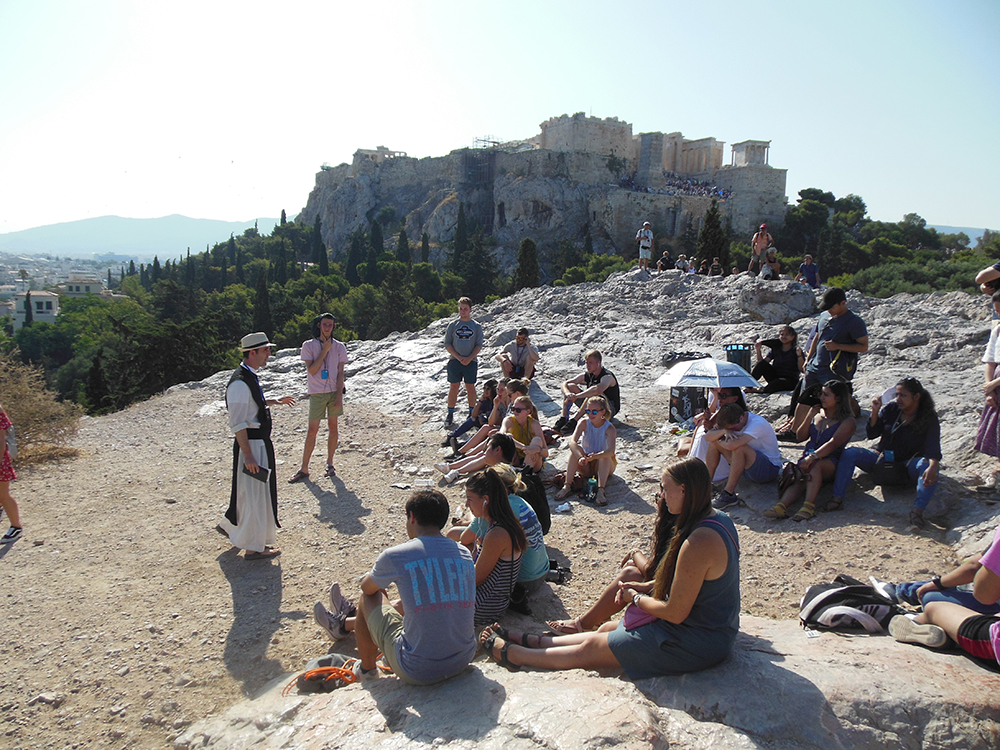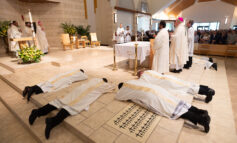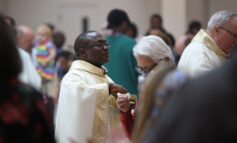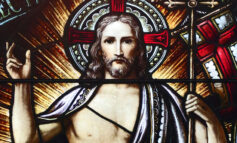
Father Thomas Esposito, left, discusses St. Paul while at the Areopagus in Greece while accompanying participants in a University of Dallas summer program.
By Father Thomas Esposito
Special to The Texas Catholic
For any flower to blossom fully, its roots must be nourished continuously and grounded in good soil. This simple fact of nature highlights, by analogy, the spiritual necessity of drawing constant inspiration from the first days and heroes of the early Church.
Since I recently visited Athens and Corinth with a group of university students, Saint Paul is the immediate subject I have in mind. On his second missionary journey, narrated by Luke in Acts of the Apostles, Paul carries the Gospel into modern-day Europe for the first time. His ventures take him to Athens, whose claims to fame can be rivaled by few other cities: the cultural capital of the ancient world, the birthplace of democracy, the home of philosophy, the heart of mythology and Greek tragedy.
A large outcropping of rock called the Areopagus, located just below the famed Acropolis and its sanctuary to Athena, is the setting for a momentous speech given by Paul to “Epicurean and Stoic philosophers” and other Athenians (Acts 17:16-21). Luke could not have constructed a more fitting and dramatic scene for the first encounter between the Christian Gospel and Greek philosophy. The Athenians give Paul the stage (or, rather, the rock) to present his message, one that they initially misconstrue as a new series of deities featuring “Jesus” and his female consort “Resurrection” (the Greek word is the source of the name Anastasia)!
Even in the initial centuries of Christianity, some believers felt that the pagans had nothing valuable to offer the Christians, and that Athens, representing human reason alone, was totally irrelevant to Jerusalem, the revealed truth of Christianity. The same temptation to divorce faith and reason, or religion and science, exists today, and is perhaps even more pronounced than ever. But what Paul accomplishes in his speech on the Areopagus is nothing less than a masterpiece of dialogue, a blueprint for evangelization both then and now, a thorough rejection of the split between the human and divine as understood by the Catholic tradition.
With his one chance to win over the Athenians, Paul does not launch immediately into a loud harangue about the necessity of accepting Jesus Christ and the certainty of Hell for those who remain in their polytheism and sin. He rather acknowledges the correct instincts of the Athenians, praising them for their religious devotion and promising to share with them the fullness of what (or whom) they already know in part: “For as I walked around looking carefully at your shrines, I even discovered an altar inscribed, ‘To an Unknown God.’ What therefore you unknowingly worship, I proclaim to you” (Acts 17:23). He then highlights what his audience is already familiar with: that the cosmos is harmonious and well-ordered, that divinity utterly transcends the mortal realm and cannot be confined to statues or sanctuaries made by human hands. Paul’s argument implicitly refutes the atheistic attempts ancient and modern to assert that man created the gods (or God) in his own image. We are not the source of divinity: “Rather it is He who gives to everyone life and breath and everything […] so that people might seek God, even perhaps grope for Him and find Him, though indeed He is not far from any one of us” (17:25-27).
Paul even quotes the poetry of one and perhaps even two Greek poets in preparing the soil for the Gospel seed: “For ‘In Him we live and move and have our being,’ as even some of your poets have said, ‘For we too are his offspring’” (17:28). Only then, after laying solid foundations from the stone of Greek thought itself, does Paul then introduce more recognizably Christian concepts: repentance, judgment, the resurrection of a man from the dead (17:29-32). Paul does not even speak the name of Jesus before the Athenians cut him off, scoffing at the notion of resurrection.
Luke notes that Paul manages to make a few convents during his time in Athens; one of them, Dionysius the Areopagite, is by tradition the first bishop of Athens. Paul, then, does not achieve a triumphal success at the time of his preaching. In laying such solid foundations for dialogue, however, both he and Luke with him create a perennial roadmap for Christians animated by the same zeal that flung the Gospel to the corners of the earth: an awareness that good soil is present everywhere, and that the Gospel is capable of receiving and purifying whatever is good and noble in the human heart, no matter how pagan it may appear.
Father Thomas Esposito, O.Cist., is a theologian and monk at the Cistercian Abbey of Our Lady of Dallas in Irving. His column appears occasionally in The Texas Catholic.



